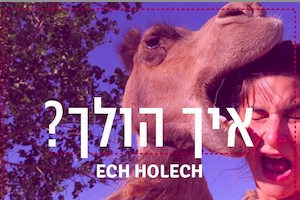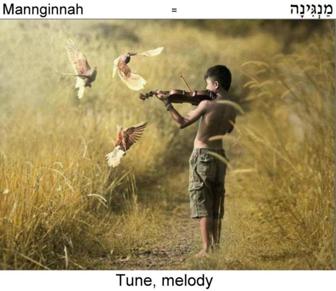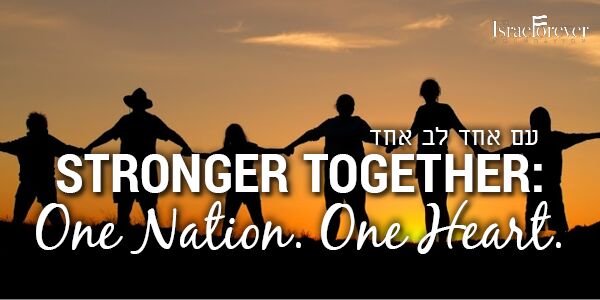Finding My Israeli Identity in Hebrew
by Paul Jacobson
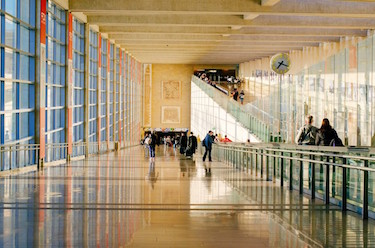
Becoming an Israeli citizen was the easy part. It happened in about an hour and a half after we arrived at Ben Gurion Airport almost a year ago.
What has proven to be much more elusive is my sense of my Israeli identity.
I am an עולה חדש (oleh hadash – new immigrant) and the more time we spend here the more I believe that being fluent in Hebrew is my key to unlocking my new identity.
Hebrew is a remarkable language. It was drawn out of Biblical texts and given new life for a modern world about a century and some change ago and millions of Israelis use it daily like I use English or like you use any number of other languages. I wasn’t sold on the language in the beginning, mostly curious, but the more I am exposed to it the more I like it, love it even.
I am infatuated with the Irish accent, have been for about as long as I can remember. I didn’t think I would start to feel the same way about some Israeli accents with its overwhelming use of the “חחח” sound (somewhere between the “ch” in “cheese” and in “cherie” and “chez”) but having so many variations of the accent influenced, largely, by immigrant Israelis’ original accents creates many appealing flavours. French-, Italian- and Spanish-flavored Hebrew accents are among my favorites.
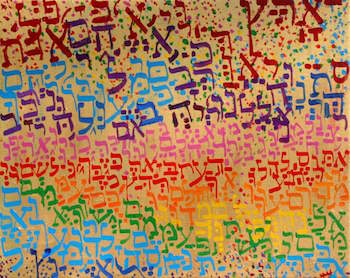
Beyond the accent, the language itself says a lot about Israeli culture. It has turned abbreviations and contractions into an art form. It embodies the Israeli impatience to move on and get stuff done. Sure, you can do fine here with minimal Hebrew and English, but if you really want to integrate, you need to learn Hebrew. Without it you will never quite become part of the culture.
I consider myself a decent writer (well, you tell me?) and using the English language is critical professionally. It is also one of the primary ways I express myself so not being able to express myself effectively in Hebrew is pretty frustrating. Sure, it takes time to learn a new language. Unlike our children who have absorbed enough Hebrew to be able to use it almost exclusively day to day, I still struggle with basic conversations. I lack the vocabulary and, I noticed, seem to have performance anxiety when I’m speaking. Of course the cure for that is speaking more so there is that.
Thankfully, the Israeli government gives new olim free Hebrew classes (5 months if you do it full time and 10 months part time) and I have learned so much in the last year. The challenge is making sure you go to class, do your homework and, most importantly, use what you learn outside class (which is where I could improve a lot more).
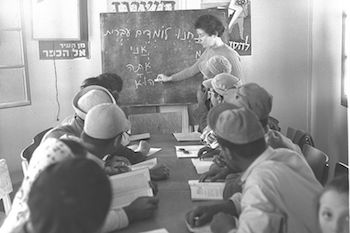
The more I think about it, I realise that learning a language is really pretty simple: you just have to immerse yourself in it and use it as often as you can. Leaving aside the language’s relative complexity compared to your home language. I don’t think there is any other way around that. My teacher often emphasises that you need to love the language and I agree with that. If not love it, you have to have the determination to learn it and the persistence to stick with it.
I’ve met a couple people who just haven’t been able to pick it up despite trying for years and I imagine many people won’t learn the language. The rest of us can and will, if we make the decision to do it and to keep making horrible mistakes until we stop making them. I’m determined to improve to a point where I can write as well in Hebrew as I do in English. I have no idea how long that will take but my journey towards that point continues with my next awkward Hebrew conversation.
I noticed that people talk about nationality in terms of Israelis and South Africans, Americans, British and so on. Americans seem to have always spoken about immigrants as “X Americans”. For example, French Americans, African Americans, Indian Americans and so on. They acknowledge people’s different origins at the same time they affirm their shared identity as Americans. The convention seems a little absurd to me, at times, but it is a useful approach to defining a nuanced identity in a new country.
I resisted being labelled as a “South African” after we arrived here. I became an Israeli about an hour after we landed at Ben Gurion airport. At that point, my South African citizenship technically ceased. I started referring to Israelis as either “born Israelis” or “Olim”, but Israelis in both cases. I resist being identified as a South African here, not because being South African is something to be ashamed of (it isn’t although what has happened in South Africa is unfolding as a tragedy of missed opportunities) but rather because being identified as South African creates a distinction between me and born Israelis. The same applies to labels such as “British”, “American” and even “Anglos”, at least as a way of describing national identity. I am an Israeli, albeit a Learner Israeli.
Beyond citizenship, though, language unites us as a coherent nation. Jews have historically been divided geographically and culturally. Jewish communities have grown and thrived on almost every continent and each community has developed in its own way to some degree or another.
I have been reading about Israel’s and Jews’ histories (the latter is a precursor for the former) since we arrived and the sheer diversity we have as a collective is wonderful. What unites us, fundamentally, is our shared history, norms and our belief system (even secular Israelis).

At the same time, we are still somewhat divided along ethnic grounds in a sense. I’ve been learning more about the tension between Ashkenazi (mostly Eastern European Jews) and Oriental Jews (North Africa, Middle East as far as I can tell) which creates profound social and economic distinctions in Israel. Coming from a nation once sharply divided along racial lines, these cultural tensions seem a little absurd given what we share as Jews but, then again, I am Ashkenazi, more adaptable to Israel’s Western bias and still very new to Israel and all its cultural and social complexities. Like South Africa, Israel has an opportunity to become even more united and stronger in the process if our leaders can find a way to convert our differences into overlapping enhancements.
Yiddish once distinguished Eastern European Jews from their neighbours and also created a shared cultural bond. The Holocaust almost obliterated that commonality when millions of Yiddish speakers were murdered. Yiddish survives today and, as I understand it, is mostly still in daily use in ultra-Orthodox communities where Hebrew is still regarded as a holy language to be reserved for prayer and religious observance.
Here in Israel, Hebrew brings us together again and helps define our Israeli identities. For the most part, if you hear someone speaking Hebrew outside of a religious context, that person is probably an Israeli (although not necessarily Jewish — non-Jewish Israelis also usually speak Hebrew for day to day use). Again, it is essential that you speak Hebrew to make a life in Israel but, I suspect, if you don’t you will tend towards living and working in communities that speak your language and, in the process, creating a linguistic ghetto.
One of the Russian olim in my ulpan class was telling me (in Hebrew, ironically, because he doesn’t speak much English) that he speaks Russian at work, his family is Russian and he shops at Russian stores so his day-to-day exposure to Hebrew is very limited, almost non-existent. I’m sure there are many Anglos who have a similar experience and when they need to interface with some sort of Hebrew language bureaucracy, they either seek out a more familiar language option (most government and commercial services seem to offer Russian language options — sometimes English too) or they get help from someone who can translate.
When we arrived we opted to integrate more into Hebrew speaking Israel. We placed our kids in a Hebrew language school instead of a blended English-Hebrew school for olim children because we wanted our kids to learn Hebrew and integrate faster. They struggled a little for a couple months and then the wonders that are their young brains sucked in the language and they have learned enough to integrate with their Hebrew speaking friends and teachers. Their challenge now is building on that knowledge and having parents who are slower at learning the language is becoming a hindrance (although I’m trying to keep up).
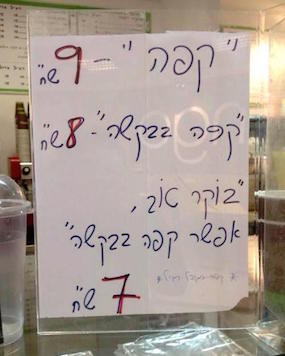
I wonder how much their sense of identity has shifted since they arrived here. I suspect the answer is that our kids don’t really think about identity in those terms. To them, they are their identities and nationalities are fringe elements. Perhaps growing older makes you more inclined to find a group to belong to and with so many overlapping groups and sense of belonging, it can be difficult to make sense of it all and find that golden thread that is your unique identity.
To me, my grasp of Hebrew has become a fundamental part of my Israeli identity. The language is tied to the land and to its people and it is also the primary language in religious life too. It is the thread that binds us to our land, to our faith (and many of our principles for secular Israelis) and to each other. Although we have only been here for a year and I am still very much a learner Israeli, it feels as if not knowing the language leaves you with a part of your identity absent here.
I still have a long way to go before I feel comfortable using the language and I think that is due, largely, to performance anxiety when I use my limited Hebrew it (especially speaking) and being lazy about using it more often. Sure, my vocabulary is a factor but the big hurdle is using what I have and being comfortable making more mistakes than I would expect and building my vocabulary by reading, listening, watching and engaging daily.
My ulpan class is ending soon and my teacher has invited my class to continue with the next level. I won’t be joining them, even though I’d love to continue learning with him. My wife is going to begin her journey in February. My teacher asked me if I couldn’t continue at the same time Gina starts her classes (they’ll probably be on different days) and besides it being Gina’s turn, I think it is also time for me to take my day-to-day ulpan class seriously, namely my day to day life.
In an interesting synchronicity, I received a call from a mobile services company inviting me to switch to them from my current provider as I was typing this. I understood the gist of what she was saying and managed to communicate without inadvertently buying something (big step!). It was frustrating but also an affirmation of a sort. I’m still getting started here and I’m passionate about learning Hebrew and better understanding what it means for me to be an Israeli. It isn’t easy but it’s worth persisting with.
Postscript: Although I started writing this article a couple weeks ago, we just passed our first major milestone in Israel: our first anniversary. It seems like a perfect time to share my thoughts about my emerging Israeli identity and its intrinsic link to the Hebrew language, at least for me.
Paul Jacobson is a writer, photographer and a "learner" Israeli with a proclivity to share his experiences in and thoughts about Israel and integrating into Israeli society on his blog and the social web. He made Aliyah to Israel from South Africa in December 2014 and lives in Modi'in with his wife and amazing children.


